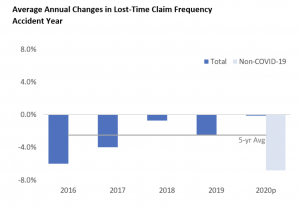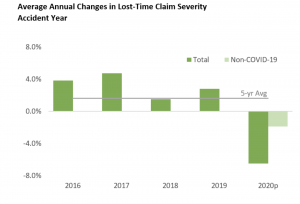on WCRI’s 38th Annual Issues & Research Conference, March 16-17, 2022. Mid-March is a great time to be in Boston! Then again, pretty much anytime is.
Register here.
on NCCI’s latest update on claim frequency and severity – spoiler alert, frequency is still declining, although it’s hard to unpack the influence of COVID from structural drivers. Hat tip to Carolyn Wise and Kevin Fernes for their helpful research and cogent explanation of the data.

More surprisingly, severity – which is workcomp-ese for costliness – declined last year – for non-COVID claims.

Also notable – and consistent with what I predicted last year – COVID claims are way less costly – as in two-thirds less costly – than non-COVID claims (this isn’t about chest-pounding, rather pointing out that this was predictable – but few in the WC world have the health care/medical system insights to do so)
Also worthy of your attention, Chris Brigham MD is hosting a discussion of Post-Acute COVID via Webinar – registration is here and is complimentary.
Finally, in yet another example of the consequences of stupid, a physician who testified before Congress that Ivermectin would prevent COVID…wait for it…got COVID. As concerning, there have been 2021 1,810 cases of ivermectin poisoning in the U.S. in the first 10 months of this year, compared with 499 for the same period in 2019.



Joe,
The low frequency is also predictable. The stay-at home effect is very large. Regarding COVID severity, a very heavy majority of the claims are for temporary total benefits for a week of quarantine. These are very inexpensive claims. The number of COVID claims that include ICU stays that I have seen has been very very low. Hence the low severity on COVID.
Thanks for the color on this Jeffrey – to other readers, Jeffrey is a consulting actuary that sees a LOT of data…
cheers Joe
Joe, I’ve said this before and I’ll say it again. The NCCI data is looking in the wrong place. The vast majority of COVID related WC claims are coming from municipalities (EMTs, Firefighters and police) and hospital systems. Neither are adequately represented in the NCCI data. It’s like only being awake when the sun is out and not believing in the night actually exists. Employers in these spaces are getting hammered by COVID. Not only are they getting hammered but many of the hospital systems are absorbing the costs associated with the treatment and hospitalization of their employees so actual losses are not even getting reported in many cases. Yes the sky is not falling but just because you can’t see it (and the NCCI can’t see it) doesn’t mean it’s not there.
Thanks for the note Dennis.
If the vast majority of COVID claims are NOT in the NCCI data, that strikes me as a frequency issue, not necessarily a severity issue. The severity of COVID claims shouldn’t vary based on the job type, therefore COVID claims aren’t as costly as non-COVID claims.
Re frequency, I looked at CWCI’s database which is quite robust as it includes self-insured, governmental, and insured claims. Yes, healthcare and public safety account for 59% of all accepted COVID claims. However, the volume of COVID claims has dropped dramatically in 2021; since January, COVID claims accounted less more than 10% of total projected claims. https://www.cwci.org/CV19claims.html
While it is certainly possible some hospitals and/or healthcare systems are not reporting medical costs associated with treating their own workers, treatment costs for COVID are quite low – a data point that is consistent in group health and other data as well as workers’ comp (and documented elsewhere in this blog). I’m not sure why a risk manager would not report those costs; perhaps I’m missing something here.
Not to dismiss the above, if some healthcare systems don’t report the costs of care delivered to their own employees, by definition that cost doesn’t affect workers’ comp – so our sky stays up in the heavens.
be well – Joe